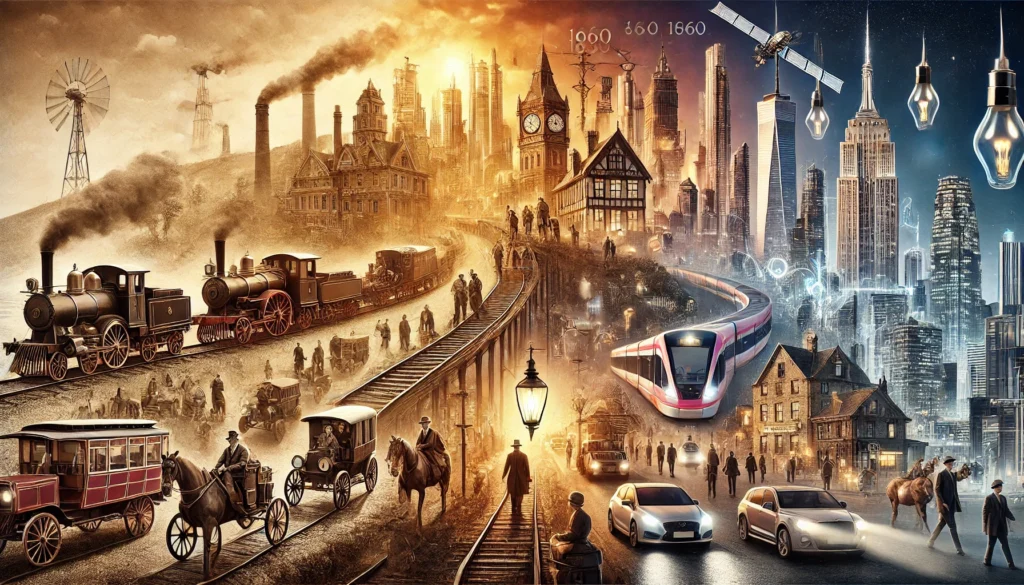The period spanning the generations before and after 1860 was a transformative time that reshaped the trajectory of human civilization. Marked by technological breakthroughs, societal upheavals, and environmental awakenings, this era encapsulates the growing pains and triumphs of progress. Let’s explore the profound changes that unfolded during this critical chapter of history.
1860: A Turning Point for Humanity
The election of Abraham Lincoln in 1860 signaled a dramatic shift in global dynamics. Democracy hung in the balance as nationalism and imperialism surged. For the first time in history, the world’s population crossed the 1 billion mark, reflecting both humanity’s resilience and the mounting pressures on global resources. This turning point heralded the dawn of a new era.
The Industrial Revolution: From Steam to Electricity
The shift from steam power to electricity revolutionized every facet of human activity. Industries expanded, travel became faster and more efficient, and communication networks began to connect the world. This transformation laid the groundwork for mass production, global trade, and unprecedented technological innovation. It also marked the transition from manual labor to mechanization, forever altering society.
Knowledge Sharing: The Legacy of the Printing Press
The invention of the printing press 400 years earlier had sparked an information revolution. By the mid-19th century, the ability to disseminate knowledge was accelerating societal advancements. Wisdom, once the preserve of a privileged few, became accessible to the masses. This democratization of information set the stage for exponential growth in science, philosophy, and education.
Advances in Medicine and the Gift of Time
In 1860, life expectancy hovered under 40 years, and simple infections often proved fatal. By the early 20th century, breakthroughs like antibiotics and better hygiene practices dramatically reduced mortality rates. Medical progress extended lifespans and enhanced the quality of life, freeing humanity from many age-old afflictions.
The Hydroelectric Power Revolution
The 1882 debut of the world’s first hydroelectric power plant in Wisconsin introduced the hydrologic age. Grand projects like the Hoover Dam didn’t just generate electricity—they symbolized human ingenuity and cooperation. Hydroelectric power transformed agriculture, industry, and daily life, demonstrating the potential of renewable energy to shape nations.
The Costs of Technological Progress
While technological advancements ushered in convenience and luxury, they also created new challenges. Industrialization brought pollution, resource depletion, and social inequality. Acid rain, smog, and unsafe working conditions were byproducts of rapid development. Balancing progress with environmental responsibility became a pressing issue.
The Power of Water
Water, the lifeblood of civilizations, played a central role in this era. Harnessed for energy, irrigation, and industry, it fueled prosperity while also posing risks. False floods, droughts, and the burgeoning problem of eutrophication (nutrient pollution leading to dead zones) underscored the need for sustainable water management.
Challenges Beneath the Waves
By the late 20th century, oceanic health faced unprecedented threats. Dead zones, microplastics, overfishing, and climate change began to devastate marine ecosystems. These challenges illuminated the urgent need to protect the planet’s most vital resource for future generations.
Electricity: A Double-Edged Sword
The mastery of electricity unlocked human potential, enabling marvels like telescopes and electron microscopes. Yet, its widespread use disrupted natural rhythms. Electromagnetic fields (EMFs) and industrial byproducts affected ecosystems and human health, illustrating the dual nature of innovation.
Balancing Rights, Regulations, and Responsibility
The evolution of democracy and human rights in this era revealed a critical truth: freedom must be tempered by responsibility. Sustainable progress requires accountable governance, equitable policies, and respect for both people and the planet.
Lessons from the COVID Era
The global pandemic of the 21st century provided a stark reminder of nature’s resilience. Temporary pauses in human activity allowed air, water, and ecosystems to recover rapidly, offering a glimpse into the benefits of sustainable living.
The Pursuit of Wisdom and Spiritual Insight
Science, philosophy, and spirituality converged during this period, underscoring the importance of holistic progress. Knowledge drives discovery, but wisdom and spiritual insight guide humanity toward greater harmony and purpose. True progress blends innovation with a deep respect for life’s interconnectedness.
This pivotal era in history teaches us that progress is never without challenges. By learning from the past and embracing a balance of innovation, responsibility, and spiritual growth, we can navigate the complexities of the modern world while honoring the foundations laid by the generations before us.
#HistoryMatters #IndustrialRevolution #Hydropower #Sustainability #KnowledgeSharing #InnovationAndResponsibility #OceanConservation #ElectricityAndLife #BalancingProgress

